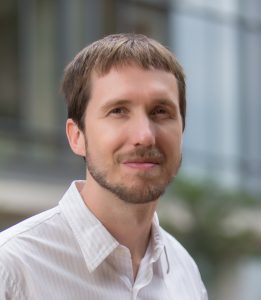
Jeremy Purvis, Assistant Professor, Department of Genetics was awarded a five-year grant through the Faculty Early Career Development Program of the National Science Foundation. The proposal is titled “Predicting cell fate from cell history: Theory, experiment, and outreach.”
The overarching hypothesis of the study is that, in addition to environmental cues, an individual cell’s fate is strongly influenced by the sequence of events that occurred both within the cell’s own lifetime as well as during the lifetimes of its ancestor cells. This hypothesis will be pursued by developing a computational model of single-cell lifetimes and lineage relationships and applying these models to understand, in quantitative terms, how a cell’s individual and family history influences its fate decisions. The project will employ fluorescence time-lapse microscopy to quantify inheritance patterns across thousands of related cells spanning multiple cellular generations. Cells will be challenged with environmental stresses or developmental signals and the fates of individual cells and their offspring will be determined. With these data in hand, mathematical models will be used to: (i) understand how the lifetimes of individual cells are regulated; (ii) quantify how single-cell traits are inherited; and (iii) determine how molecular events in a cell’s history determine its fate.

The research objectives described above are deeply integrated with community outreach activities designed to engage and impact a diverse group of students. The team will develop an online Cell Tracking Game in which students from an urban elementary school crowdsource the problem of tracking individual cells over time and identifying mitotic division events that define a cell’s family history. Students will earn points for each successfully tracked cell; learn basic principles of cell biology; will be acknowledged by name in any resulting publications in which the tracked data is used; and will be quantitatively assessed for learning impact. In addition, the lab will host an open competition, the Cell Fate Challenge, in which local high-school students compete to develop the most accurate model of cell fate decisions using public training data and private testing data sets. Throughout all phases of the project, the Purvis lab will maintain their ongoing, and demonstrated, commitment to mentor students from under-represented populations by engaging them in ongoing research projects and sharpening their critical thinking skills.
Congratulations to Dr. Purvis and his team!
